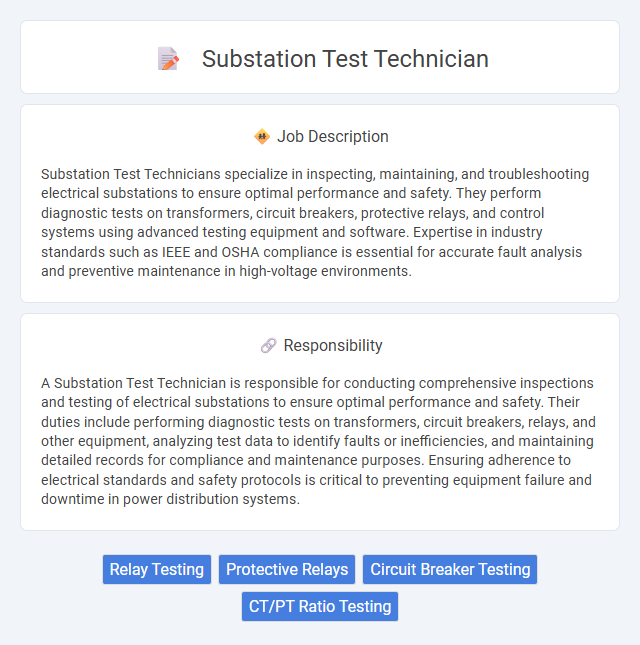
Substation Test Technicians specialize in inspecting, maintaining, and troubleshooting electrical substations to ensure optimal performance and safety. They perform diagnostic tests on transformers, circuit breakers, protective relays, and control systems using advanced testing equipment and software. Expertise in industry standards such as IEEE and OSHA compliance is essential for accurate fault analysis and preventive maintenance in high-voltage environments.
Individuals with strong technical skills and an interest in electrical systems are likely suited for a Substation Test Technician role. Those who can work safely under pressure and in varying environmental conditions might find this job suitable. People uncomfortable with physical demands or high-risk environments may face challenges in this position.
Qualification
A Substation Test Technician must possess specialized knowledge in electrical engineering principles and proficiency in testing high-voltage equipment such as transformers, circuit breakers, and protective relays. Certifications like NETA (InterNational Electrical Testing Association) and OSHA safety training are critical for ensuring compliance with industry standards. Experience with diagnostic tools and software for troubleshooting and commissioning electrical substations enhances job performance and reliability.
Responsibility
A Substation Test Technician is responsible for conducting comprehensive inspections and testing of electrical substations to ensure optimal performance and safety. Their duties include performing diagnostic tests on transformers, circuit breakers, relays, and other equipment, analyzing test data to identify faults or inefficiencies, and maintaining detailed records for compliance and maintenance purposes. Ensuring adherence to electrical standards and safety protocols is critical to preventing equipment failure and downtime in power distribution systems.
Benefit
Substation Test Technicians likely experience significant benefits including competitive salaries and opportunities for career advancement within the power industry. They probably gain valuable hands-on experience with advanced electrical systems, enhancing their technical skills and marketability. Job stability and potential overtime pay may further contribute to the appeal of this role.
Challenge
Substation Test Technician roles likely involve complex troubleshooting and maintenance tasks requiring precise technical knowledge. The challenge may stem from diagnosing electrical faults in high-voltage environments where safety and accuracy are paramount. Adapting to evolving technologies and stringent regulatory standards could further increase the difficulty of the position.
Career Advancement
Substation Test Technicians play a critical role in ensuring the reliability and safety of electrical grids through the inspection, testing, and maintenance of substation equipment. Career advancement in this field often involves gaining advanced certifications, expertise in protective relaying systems, and leadership roles such as Project Supervisor or Maintenance Manager. Proficiency in diagnostic technologies and adherence to industry standards like IEEE and NETA increase opportunities for higher-level positions and specialized technical roles.
Key Terms
Relay Testing
A Substation Test Technician specializing in relay testing conducts precise diagnostics to ensure the accuracy and reliability of protective relays within electrical substations. This role involves calibrating, commissioning, and troubleshooting relays to prevent equipment failures and maintain grid stability. Expertise in using advanced testing instruments and interpreting relay settings is crucial for safeguarding complex power systems and minimizing downtime.
Protective Relays
Substation Test Technicians specializing in Protective Relays are responsible for calibrating, testing, and maintaining relay protection systems to ensure the stability and reliability of electrical substations. Their expertise in interpreting relay settings, analyzing fault data, and performing primary and secondary injection tests is critical for preventing equipment failures and power outages. Proficiency with testing equipment such as Omicron, Doble, and Megger, along with a thorough understanding of IEEE C37 standards, enhances accuracy in troubleshooting and commissioning protective relays.
Circuit Breaker Testing
Substation Test Technicians specialize in Circuit Breaker Testing to ensure the reliability and safety of electrical power systems. They perform insulation resistance, timing, and contact resistance tests using advanced diagnostic equipment to detect faults or wear in high-voltage circuit breakers. Precise test data analysis helps prevent equipment failures and maintain uninterrupted power distribution in substations.
CT/PT Ratio Testing
Substation Test Technicians specialize in performing CT/PT ratio testing to ensure the accuracy and proper functioning of current transformers (CTs) and potential transformers (PTs) within electrical substations. Precise CT/PT ratio testing is critical for maintaining system protection and metering accuracy, helping to prevent equipment damage and operational failures. They utilize advanced testing equipment such as digital relay testers and ratio meters to verify transformer performance according to industry standards like IEEE and IEC.
 kuljobs.com
kuljobs.com